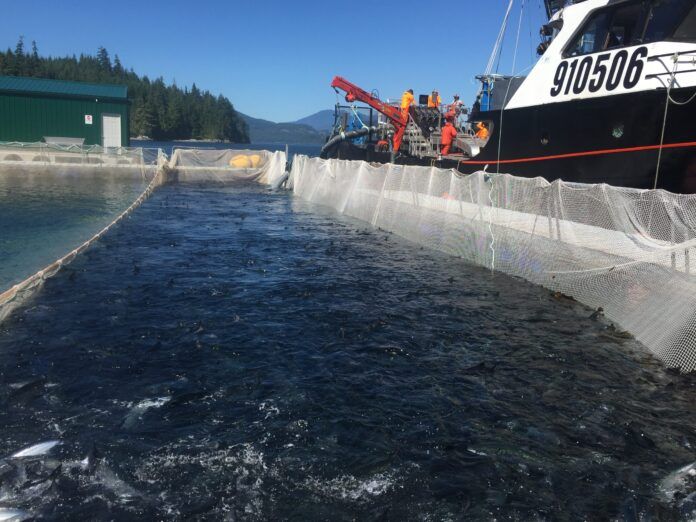BC salmon farmers are still pushing for clarity about their future with a 2029 ban looming, but spokesperson Brian Kingzett says new details haven’t been forthcoming.
Now, with a potential trade war looming with the USA over exports, he says the province needs to step up and support one of BC’s largest food producers, and exporters.
“We need the province to stand up for this sector and the Island, and we’ve been very clear that it will be the provincial government picking up the pieces if this industry falls,” says Kingzett, speaking for the BC Salmon Farmers Association.
Kingzett spoke to Campbell River council this week with an update on the industry, including how it’s responding to the federal government’s decree to close all conventional ocean farms in BC in 2029. He says information from the government about a long-promised transition plan remains sparse, but estimates it will ultimately cost taxpayers $9 billion.
The ban will be the end of the BC industry, he says.
“I’ll be really blunt. The effect of that ban as it stands now, is that we will probably see the sector leave Vancouver Island because of the investment uncertainty it has caused,” he says.
He says the sector has already lost out on a billion dollars in capital investment and lost 1,500 jobs because of the incoming federal ban and closure of all farms in the Broughton Archipelago and Discovery Passage during the last five years.
Brain Drain
Some of those jobs involve high-tech engineering, and if the ban goes through the Island will lose made-in-BC technology businesses, he adds.
That includes Poseidon Ocean Systems in Campbell River, which started as a small business providing aeration and water quality monitoring systems to local farms, but has expanded to export its technology all over the world.
“As we continue to take away the actual farming in the sector, it becomes less and less business for them and less reason to remain here in the North Island, and to continue to attract that kind of brainpower that produces that innovation,” he says.
He says Poseidon continues to grow but isn’t producing any new systems for BC right now, because of uncertainty in the sector.
Grocery price hike
Another unforeseen consequence for Vancouver Island if the sector leaves would be higher grocery prices, especially in smaller northern communities.
Most of the salmon farmed in BC is taken off the Island in refrigerator trucks and sent east, or south of the border. They don’t come back to the Island empty, and their absence will have unexpected impacts, Kingzett says.
“Their backhaul — they take fish off the island for export — brings groceries back on to Vancouver Island which go all the way up to Klemtu,” he says. “Basically, that cheap backhaul is subsidizing all of our grocery prices here on Vancouver Island.”
On June 19, 2024, the Government of Canada released a policy statement on the future of salmon farming in B.C. The statement commits to the implementation of a ban on “open net-pen” salmon aquaculture in B.C. coastal waters by June 30, 2029. Effective immediately, it requires that new salmon aquaculture licences utilize closed-containment technology.
The industry has several systems in trial stages and has explored closed-containment for decades, but says it’s not practical or economical to operate them at a scale large enough to replace the industry’s current production levels.
Indigenous communities impacted
The remaining salmon farms in BC operate with Indigenous partners and oversight. In December the Coalition of First Nations for Finfish Stewardship travelled to Ottawa along with salmon farmers from BC to speak out against the federal government’s ban.
“This ban will sink us. This will sink the North Island,” said Isaiah Robinson, deputy chief councillor of the Kitasoo Xai’Xais First Nation, who was part of the gathering.
Dallas Smith, spokesperson for the coalition, says Indigenous communities that have reduced poverty and social issues thanks to the economic benefits from salmon farms will be hurt the most, and have been left out of the conversation.
“We’re tired of the federal government talking to us about the decisions they’re making in our territories,” he said. “They are listening to activists and ministers… who are continuing to interfere with our rights and self-determination.”






